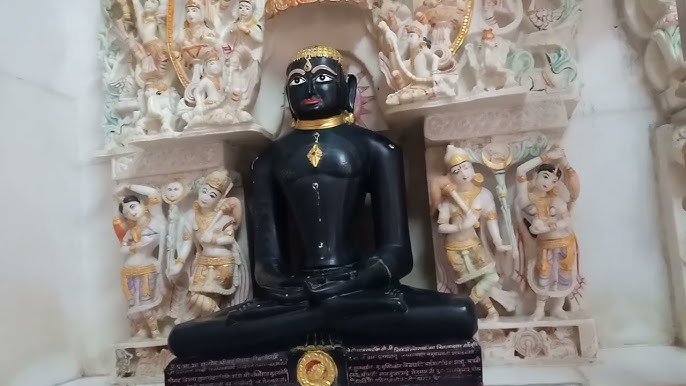Introduction
Mandovra Parshwanath Tirth is a historically significant Jain pilgrimage site located in Mundava village, near Sojat, Rajasthan. This sacred site is famous for its miraculous origins and deep spiritual significance. The temple houses the revered idol of Bhagwan Mandovra Parshwanath, worshipped for centuries.
The Idol of Mandovra Parshwanath
The main idol (Mulnayak) of the temple is a 32 cm high, white-colored idol of Bhagwan Parshwanath, seated in Padmasana posture, with a seven-hooded serpent over his head, symbolizing divine protection and enlightenment.
The Miraculous Origin of Mandovra Parshwanath Tirth
The discovery of the idol of Mandovra Parshwanath is associated with a fascinating legend:
A devout Shravaka had a strict vow of not consuming food before offering prayers to Bhagwan. Since there was no temple in his village, he traveled five miles daily to another village to bow before a Jain idol. His devotion pleased the presiding deity, who appeared in his dream and instructed him to:
- Dig under a specific tree outside the village to find the idol of Bhagwan Parshwanath.
- Carry a basket full of barley grains and place it at the designated spot at night.
The next morning, all the barley grains had turned into gold! With this miraculous wealth, the magnificent Mandovra Parshwanath temple was built.
Temple Significance and Artistic Beauty
- The idol of Mandovra Parshwanath is known for its expressive and divine aura.
- The temple is famous for its spiritual energy, attracting devotees who seek miraculous blessings and wish fulfillment.
- The temple is recognized as “Mandovra Parshwanath”, a name derived from the ancient Mundava-Mandan region.
Annual Fair and Celebrations
A grand fair is held annually on Paush Krishna Dashami (10th day of the dark fortnight of Paush). Thousands of devotees gather to worship and seek blessings from Bhagwan Parshwanath.
Location and How to Reach Mandovra Parshwanath Tirth
- Location: Mundava village, near Sojat, Rajasthan
- Nearest Railway Station: Chandraval (4 km away)
- Distance from Sojat City: 15 km
- Transport: Buses and private vehicles are available for easy access.
- Facilities: Dharamshala, Bhojanshala, and an Upashraya are available for pilgrims.
Scriptural Mentions and Historical References
Mandovra Parshwanath Tirth has been mentioned in several ancient Jain scriptures, including:
- Shri Parshvanath Naammala
- Tirthmala (1750 CE)
- Chaityaparipati (1722 CE)
The temple has also been visited and blessed by great Jain Acharyas, such as:
- Acharya Shri Vijay Prem Surishwarji
- Acharya Shri Vijay Bhadhrankar Surishwarji
- Acharya Shri Vijay Heer Surishwarji
- Acharya Shri Bhuvan Banu Surishwarji
Other Jain Temples Nearby
Currently, Mandovra Parshwanath Tirth is the only Jain temple in Mundava village. However, devotees can also visit Jiravala Tirth, where an idol of Mundavara Parshwanath is installed.
Temple Trust and Contact Information
Shri Mandovara Parshvanath Jain Swetambar Tirth
Phone: 02960-285059
Location: Mundava, District: Pali, Rajasthan – 306306, India
FAQs About Mandovra Parshwanath Tirth
1. What is the history of Mandovra Parshwanath Tirth?
The temple dates back to ancient times and was established through a miraculous event, where barley grains transformed into gold, funding the temple’s construction.
2. What makes the idol of Mandovra Parshwanath special?
The 32 cm high white-colored idol is known for its divine aura and miraculous powers, attracting devotees seeking blessings and wish fulfillment.
3. How can I reach Mandovra Parshwanath Tirth?
The temple is 4 km from Chandraval Railway Station and 15 km from Sojat City, with easy transport options available.
4. Are there accommodation and food facilities at the temple?
Yes, Dharamshala, Bhojanshala, and an Upashraya are available for devotees.
5. When is the best time to visit Mandovra Parshwanath Tirth?
The Paush Krishna Dashami fair is the best time to visit, as thousands of devotees gather for spiritual celebrations.
For an extensive list of Parshwanath temples and their significance, visit the 108 Parshwanath Names List.
